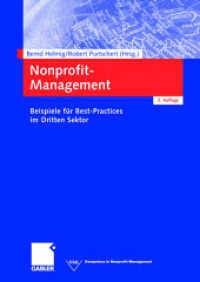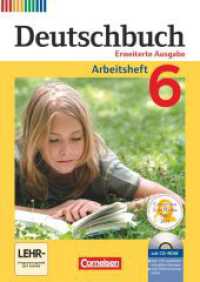- ホーム
- > 洋書
- > 英文書
- > Literary Criticism
Full Description
Takes the recent wave of German autobiographical writing on illness and disability seriously as literature, demonstrating the value of a literary disability studies approach.
In the German-speaking world there has been a new wave - intensifying since 2007 - of autobiographically inspired writing on illness and disability, death and dying. Nina Schmidt's book takes this writing seriously as literature,examining how the authors of such personal narratives come to write of their experiences between the poles of cliché and exceptionality. Identifying shortcomings in the approaches taken thus far to such texts, she makes suggestions as to how to better read their narratives from the stance of literary scholarship, then demonstrates the value of a literary disability studies approach to such writing with close readings of Charlotte Roche's Schoßgebete(2011), Kathrin Schmidt's Du stirbst nicht (2009), Verena Stefan's Fremdschläfer (2007), and - in the final, comparative chapter - Christoph Schlingensief's So schön wie hier kanns im Himmel gar nicht sein! Tagebuch einer Krebserkrankung (2009) and Wolfgang Herrndorf's blog-cum-book Arbeit und Struktur (2010-13). Schmidt shows that authors dealing with illness and disability do so with an awareness of their precarious subject position in the public eye, a position they negotiate creatively. Writing the liminal experience of serious illness along the borders of genre, moving between fictional and autobiographical modes, they carve out spaces from which they speak up and share their personal stories in the realm of literature, to political ends.
Nina Schmidt is a postdoctoral researcher in the Friedrich Schlegel Graduate School of Literary Studies at the Freie Universität Berlin.
Contents
Introduction: Contemporary German-Language Illness Writing as Literature; Analyzing Narrative Strategies, Aesthetic Forms, and Experimentations with Genre through the Lens of Disability Theory
Autofiction, Disgust, and Trauma: Negotiating Vulnerable Subject Positions in Charlotte Roche's Schoßgebete (2011)
Looking Beyond the Self - Reflecting the Other: Staring as a Narrative Device in Kathrin Schmidt's Du stirbst nicht (2009)
Intertextuality and the Transnational in Verena Stefan's Fremdschläfer (2007): Writing Breast Cancer from beyond the Border
Confronting Cancer Publicly: Diary Writing in Extremis by Christoph Schlingensief and Wolfgang Herrndorf
Conclusion: "Und was dann"; Recent Developments and Research Desiderata
Notes
Bibliography
Index








